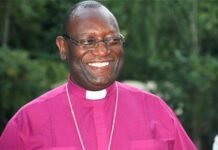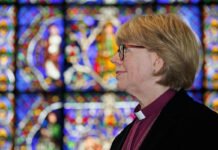This is a week of good news for the Diocese of the Southern Cross – a breakaway refuge for evangelical churches in progressive Australian Anglican dioceses (regions).
Four new churches are being added to the Diocese of the Southern Cross later this month.
A second ex-Uniting Church will become the seventh member church of the diocese on Sunday, November 26. Most of the congregation from the dissolved Sunnybank Uniting Church in inner Brisbane will form the Southern Cross Emmanuel church. Their Minister, Lulu Senituli, was one of eight Uniting Church ministers received into the Diocese in June this year.
Faith Church Sunshine Coast was the first Uniting Church congregation to re-form in the Diocese of the Southern Cross – and now is forming two branch churches that the diocese will commission on November 25.
Faith Church Brisbane and Faith Sialla church are branches of the Sunshine Coast church.
Dinka Anglican Southern Cross church will be a congregation of Southside Anglican (led by Peter Judge-Mears, formerly the Rector of St Johns, Wishart in the Southern Queensland Anglican Diocese) and be commissioned in Ipswich on November 26.
A church home for the Southern Cross
Some critics have asked, who is Southern Cross Diocese a diocese of? Here is a likely answer. Phil Ashey, a US-based expert in setting up churches, has been working with the Global South Fellowship of Anglicans (GSFA) and has cited the Diocese of the Southern Cross as an entity entitled to join a new “Covenantal Communion” of Anglicans body, GSFA is setting up. The new body will be launched in June 2024.
Up until now, the GSFA has been made up of 25 Provinces (Anglican talk for national churches) with the Diocese of Sydney included as an observer. But the new body will have a different membership based on eligible dioceses joining up – the membership page at GSFA.org is now unreachable, probably because the change is underway.
The new body will sign up dioceses, for example the Diocese of Nairobi (in the Anglican Church of Kenya) or the Diocese of Mara (in the Anglican Church of Tanzania)
Ashey, interviewed on the Stand Firm podcast, a conservative Anglican production from the US, gave a couple of examples of who might join the new GSFA “covenantal communion” that is yet to be given a name.
Individual dioceses in Kenya, maybe 10 of the 15 dioceses, was one example. And the other was the Diocese of the Southern Cross, which would gain a place in a formal church fellowship by joining.
After the Gafcon conference this year in Kigali, Rwanda, Gafcon (Global Anglican Future Conference) and GSFA have been working to “reset” the Anglican Communion, declaring in Kigali that it should no longer be led by the London-based Archbishop of Canterbury.
But Sydney, or other “official” Anglican dioceses in Australia, probably will not join the new GSFA “Covenantal Communion” as an ordinary member. The Other Cheek has been told Sydney diocese has received legal advice that they may not be able to join the “Covenantal Communion”.
This may relate to a requirement that members need to structurally distance themselves from progressives. This is part of the Cairo Covenant that full members need to sign. However, Sydney may be able to join as an associate member.
Discussing the issue of the requirements for membership of the new body, including signing a statement of faith known as the Cairo Covenant, Ashey said, “I think so, and I only hedge it with, I think so because it’s not going to be quite as clear language, but you can’t sign the Cairo Covenant and say that you remain in communion, in good conscience in communion with any church that approves same-sex blessings or [the Church of England’s proposed blessing payers for same sex couples]. It’s not possible because the language of the Cairo Covenant says we are not in communion with those churches.”
The Cairo Covenant includes this provision: “Our Churches are out of communion with those Churches that allow the blessing of same-sex relationships or purport to solemnise same-sex marriages in their doctrine and practice or admit to holy orders those in same-sex unions, and those churches that pursue other significant departures from Biblical teaching.”



